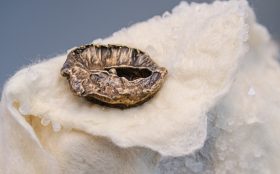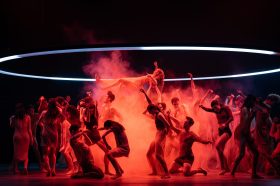Hayden Maher and Josh Quong Tart in The Judas Kiss. Photograph (c) John Marmaras.
It’s 1895 and Irish playwright Oscar Wilde is enjoying huge success as London’s brightest literary star. He seemingly has it all: a hit show in the West End (the incomparable play The Importance of Being Earnest); a generous income from his plays and writing; and a home of his own with a wife and two children. For many years, Wilde’s homosexuality was an open secret in London society, especially amongst the artists and aristocrats in his world. His wife Constance conveniently kept a stiff upper lip and looked away. This idyllic life could have continued indefinitely if not for the excesses of his lover, Lord Alfred (Boisie) Douglas whose father, the Marquis of Queensberry, was outraged by the affair. Encouraged by Boisie, Wilde launched a doomed libel case against the Marquis. This alone sealed Wilde’s fate as the case collapsed and criminal charges were laid.
David Hare’s play opens in Wilde’s suite at the Cadogan Hotel. Here is a brief moment of respite for Wilde to decide whether to flee the country to escape the charges, or stay and face the courts. Josh Quong Tart is immediately believable as the troubled Wilde. His last few hours of freedom are shared with his closest friends, the old lover Robbie Ross and the manipulating Boisie. Simon London is superb as Ross, the loyal and devoted friend in turmoil over Wilde’s refusal to leave before the police arrive. Hayden Maher is less convincing as Boisie, playing him as a loud, petulant bully. He is a nasty piece of work, but a little less shouting would give his character more depth. This is probably a criticism of director Iain Sinclair rather than Maher. Similarly, Robert Alexander has the presence required to play the Hotel Manager but his ponderous delivery can sound awkward.
The triangle of Ross, Boisie, and Wilde gives the play its emotional axis. Ross loves Wilde, Wilde loves Boisie, and Boisie only loves himself. It is Boisie who convinces Wilde to stay despite Ross begging him to leave whilst he can. But Wilde himself is complicit in his own downfall, saying ‘This is England – there is always a hanging’. And he’s portrayed as a fatalist, saying ‘I am trapped in the narrative of my own life that sweeps me along to my demise’. Act One ends as Wilde is arrested.
Act Two opens in a sparse white on white set, decorated only with a handsome naked man. We are in Naples where Wilde and Boisie are living modestly following Wilde’s release. The naked man is Galileo, a local fisherman and Boisie’s Napolitan lover. Wilde has been so broken by two years in jail that even Galileo’s obvious charms can’t tempt him. ‘Did you see stars?’ he asks Boisie. David Soncin is brilliant as Galileo – with and without clothes – gentle, funny, and intelligent.
Wilde is unwell, the money is fast running out, and society has turned its back on the disgraced playwright. The sensible Ross comes to Naples begging Wilde to return to his family, but his pleas fall on deaf ears. And eventually Boisie leaves, returning to his comfortable aristocratic life and declaring that it was a bit of fun and he was never really gay anyway. Abandoned now, Wilde is left to die alone just three years after his release from prison.
This is a creditable production of a difficult play that explores how a man who was so perceptive and so sharp in his writing could be such a fool for love. The conundrum is inevitably akin to Conan Doyle and the fairies.
It may be better to see this as a black box production, especially in such a small theatre. The chintzy hotel set feels cluttered and all the details – the lobster, the sauce, the footstool – serve to undermine the intensity of the play. The simplicity of the Act Two set is much more effective.
Josh Quong Tart and Simon London are as good as you would see on any stage. The supporting cast, including Hannah Raven and Luke Fewster all offer good performances.
Rating: 3 stars of of 5
The Judas Kiss
Presented by Red Line Productions in association with the Sydney Gay and Lesbian Mardi Gras
Written by David Hare
Directed by Iain Sinclair
Assistant Direction and Lighting Design by Alexander Berlage
Set Design by Jonathan Hindmarsh
Costume Design by Antoinette Barbouttis
Stage Management by Daniel Oliver
Set Construction by Col Emmerton
Cast : Josh Quong Tart, Hayden Maher, Simon London, Robert Alexander, Luke Fewster, Hannah Raven, David Soncin.
Old Fitz Theatre, 129 Dowling Street, Woolloomooloo, until 11 March 2017





